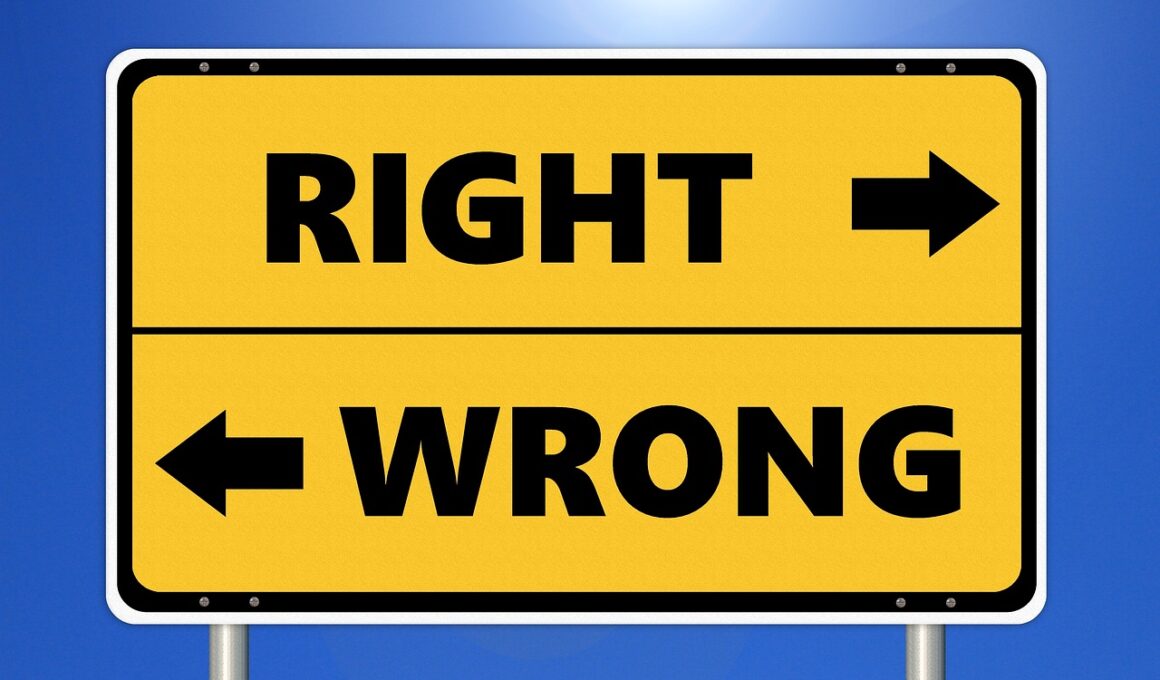How Ethical Leadership Enhances Brand Reputation
In today’s competitive business landscape, ethical leadership plays a pivotal role in enhancing brand reputation. Leaders set the tone for what is acceptable within their organizations. It is imperative that they demonstrate ethical behavior consistently, as this influences employee morale, customer trust, and investor confidence. Companies led by ethical leaders are often perceived as more reliable and responsible, leading to a significant competitive advantage. Additionally, a strong ethical leader will encourage a culture of transparency and accountability. When employees see their leaders acting ethically, they are more likely to mirror that behavior, creating a ripple effect throughout the company. This alignment not only improves internal dynamics but also attracts customers who prioritize ethical practices in their purchasing decisions. By promoting transparency, ethical leaders can build trust with clients and stakeholders, essential for long-term success. Trust is fundamental in maintaining customer loyalty and positive brand sentiment, which can directly impact sales and profitability. Therefore, businesses that prioritize ethical leadership will likely see a measurable enhancement in their overall brand reputation and market position over time.
Furthermore, ethical leadership fosters a deep emotional connection with customers and employees. When leadership prioritizes values such as integrity, fairness, and social responsibility, it resonates with stakeholders on a personal level. Consumers are increasingly discerning, often choosing to support brands that align with their values. This connection not only boosts customer loyalty but also enhances the brand’s image across various platforms. Moreover, ethical leaders serve as role models, inspiring team members to uphold ethical principles in their daily practices. This commitment to ethics can lead to increased employee satisfaction and retention rates, which further strengthens the company’s reputation. As employees become advocates for the brand, they transform how external audiences perceive the organization. A well-rounded reputation built on ethical leadership also attracts top talent who want to work in an environment that values ethical standards. Besides, companies with strong ethical practices often experience fewer legal issues, as their commitment to compliance minimizes risks associated with unethical behavior. Thus, ethical leadership is essential not only for brand reputation but also for operational excellence and sustainability.
The Impact of Corporate Social Responsibility
Corporate Social Responsibility (CSR) initiatives often stem from ethical leadership, serving as powerful tools to enhance brand reputation. Ethically driven leaders understand the importance of giving back to the community and supporting social good initiatives that align with their core values. Engaging in CSR can significantly elevate a brand’s standing in the public eye, demonstrating a commitment to more than just profits. When organizations actively participate in social and environmental issues, it generates goodwill and fosters a positive brand image. Stakeholders view these companies as responsible citizens, creating further loyalty. Ethical leadership in these initiatives leads to authenticity; consumers appreciate honesty and tangible efforts. Brands that integrate CSR into their operations not only improve public perception but also influence industry standards positively. This proactive approach can pave the way for collaboration opportunities with other organizations sharing similar commitments. Furthermore, a strong commitment to CSR can give companies a competitive edge, as consumers increasingly choose brands that act in socially and environmentally responsible ways. Hence, ethical leadership plays a critical role in shaping effective CSR strategies that enhance brand reputation significantly.
Additionally, effective communication is a hallmark of ethical leadership that profoundly influences brand reputation. Ethical leaders excel at conveying their organization’s mission and values clearly and transparently to all stakeholders. This ability fosters trust and alignment among employees, customers, and partners. Regularly engaging with stakeholders through various communication channels, such as social media, newsletters, or community events, reinforces transparency and accountability. By maintaining an open dialogue, leaders can address concerns proactively and demonstrate their commitment to ethical practices. This not only builds credibility but also invites collaboration from the community and stakeholders. The result is a reputation built on trust, ensuring that customers feel confident in the integrity of the brand. Ethical communication also helps organizations navigate crises more effectively; stakeholders are often more forgiving of mistakes when they believe the organization has acted with integrity. By prioritizing communication rooted in ethical values, brands can enhance their reputation over time, ensuring sustained success even in challenging situations. As a result, ethical leadership, combined with effective communication strategies, creates a strong foundation for brand reputation enhancement.
Ethical Leadership and Customer Trust
At its core, ethical leadership significantly impacts customer trust, a crucial component of brand reputation. Trust is essential in creating lasting relationships between consumers and brands, as it influences purchasing decisions and customer loyalty. Organizations led by ethical leaders tend to establish a reputation for reliability, where customers feel secure in their purchasing choices. When ethical leaders prioritize moral values and openly communicate their intentions, it resonates with consumers seeking brands they can trust. This trust is further solidified when companies demonstrate accountability, promptly addressing any issues and ensuring customer satisfaction. An ethical company is more likely to prioritize fair treatment and quality of service, leading to enhanced customer experiences. As a result, brands built on ethical leadership enjoy higher retention rates. Additionally, satisfied customers are more likely to share positive experiences, boosting brand reputation through word-of-mouth marketing. In an age where consumers have more options than ever, brands that cultivate trust through ethical leadership stand out in a crowded marketplace. Thus, fostering customer trust becomes one of the most significant benefits of ethical leadership in enhancing brand reputation.
Moreover, ethical leadership is a powerful driver for innovation within organizations. When leaders advocate for ethical practices, they foster an environment where creativity and integrity go hand-in-hand. Employees in such environments are encouraged to share ideas without fear of retribution, leading to innovative solutions that can transform business practices. This culture of ethical innovation can lead to the development of products and services that prioritize sustainability and social impact. Companies that are seen as innovators gain a competitive edge in their respective markets, as consumers are drawn to cutting-edge solutions that also align with their values. Ethical leaders can also access diverse viewpoints, enriching decision-making processes and ultimately leading to better outcomes. Innovation based on ethical principles can enhance brand reputation even further, as it showcases a commitment to continuous improvement while being mindful of societal and environmental considerations. Consequently, the intersection of ethical leadership and innovation generates a sustainable competitive advantage by aligning brand reputation with evolving consumer expectations. Thus, ethical leadership becomes essential in sparking innovation that enhances brand reputation.
The Long-term Gains of Ethical Leadership
Finally, companies that prioritize ethical leadership often enjoy long-term financial benefits, significantly enhancing brand reputation. Ethical businesses are typically viewed as more stable, which can attract investors looking for sustainable returns. Organizations committed to ethical behavior may experience fewer legal challenges and financial penalties, reducing costs associated with compliance and litigation. Consequently, this stability fosters confidence among stakeholders, further enriching the brand’s reputation. Moreover, ethical leadership tends to create a more engaged workforce that is committed to the organization’s goals, directly impacting productivity and profitability. Employees who feel aligned with the brand’s values are more productive and enthusiastic about their work. This passion can translate into exceptional customer service, strengthening the overall brand image. Happy employees are often brand ambassadors, sharing their experiences with the public and attracting more customers. Over time, the cumulative effects of ethical leadership lead to a strong, reputable brand that stands the test of time. Therefore, businesses that embrace ethical leadership are not just investing in immediate gains but are shaping their future success through enhanced brand reputation.
In conclusion, ethical leadership serves as a cornerstone for enhancing brand reputation across various dimensions. These leaders cultivate a strong ethical culture, encouraging transparency, accountability, and innovation. With a focus on corporate social responsibility, ethical leaders help build trust and emotional connections with stakeholders. Customers are increasingly seeking alignment with brands that reflect their values, making ethical leadership more crucial than ever. The connection between ethical practices and brand reputation is evident through improved customer loyalty, retention, and long-term financial sustainability. Companies led by ethical individuals navigate challenges effectively, benefiting from increased stakeholder trust. Furthermore, the emphasis on communication and engagement solidifies brand reputation in the eyes of consumers. Ethical practices are essential not only for individual organizations but for the larger business ecosystem. As businesses continue to evolve, the need for ethical leadership will persist in shaping brand reputations positively. Going forward, organizations must recognize that ethical leadership is not just a moral obligation but a strategic advantage that fosters growth and sustainability in immensely competitive markets.





